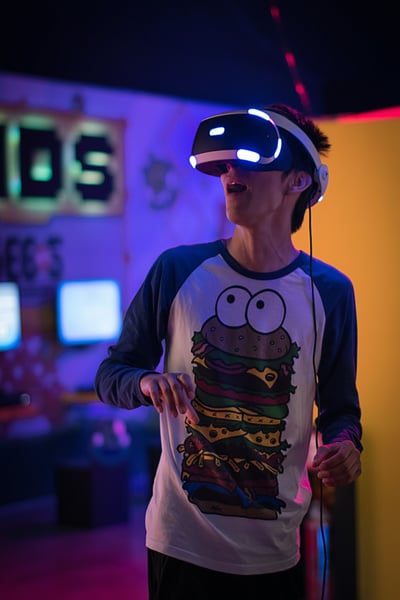
Technological innovations have been transforming the food and beverage industry at an ever-accelerating rate. Spurred on by the pandemic, the critical need for contactless customer experiences drove the rapid development of digital solutions, from in-app delivery transactions to self-service kiosks and checkouts to AI-equipped menu boards. In addition to their safety halo, these solutions provided unprecedented speed and convenience.
But when it comes to unprecedented technological innovation, the metaverse takes the cake–especially for the food and beverage industry, where the prospect of immersive virtual retail and foodservice experiences sounds sweet with potential.
Meta-whatsa, you ask? For the most part, the metaverse is an evolving idea–a futuristic feast of possibilities, with a meta-menu in the early stages of development. Video games with goggles that transport us to tantalizingly “real” alternate universes may give us a glimpse of what the metaverse can be.
“The metaverse is an oblique concept at the moment," said Jon Copestake, senior analyst with Ernst & Young’s Global Consumer Group. “From my point of view, it’s a fusion of the physical and digital worlds. The concept is to build a digital version of the world that people can engage in separately.”
Food for Thought: Metaverse in the Making
For the food and beverage industry, the metaverse could be a space for brand extensions where consumer avatars can shop, interact, play games, earn and redeem rewards, and enjoy other, perhaps yet-to-be-invented experiences and forms of engagement.
Facebook popularized the concept of the metaverse as the future of social interactions and commerce when its parent company changed its name to Meta, with plans to create its own metaverse. Think social media that can be inhabited the way gamers engage in experiences through their virtual reality headsets.
Gaming and food are already intersecting to explore metaverse possibilities. Last Halloween, for example, fast casual Mexican restaurant chain Chipotle partnered with digital game platform Roblox to open a virtual restaurant where guests could receive a code for a free burrito at real restaurant locations. The experience featured a Halloween-themed game with a chance to access virtual items.
Other forays into the metaverse include "McDonald's Hall of Zodiacs: 2022 Lunar New Year with Humberto Leon," a collaboration with the fashion brand Opening Ceremony which the burger chain described as “an immersive and interactive experience for fans that is set in the metaverse.” The Hall of Zodiacs featured an exclusive hyper-realistic collection of zodiac animal designs created by Humberto Leon, Opening Ceremony’s co-founder, to celebrate the Lunar New Year. Visitors entered the exhibit via virtual reality social platforms AltspaceVR and Spatial. What’s more, this February McDonald’s filed patents for virtual restaurants, including an online food delivery concept.
The Zodiacs exhibit underscored the promotional possibilities of the technological advances leading to the metaverse. As Joseph Schumaker, president and CEO of foodservice consulting start-up FoodSpace, pointed out: “There’s currently so much going on now in terms of technology that the metaverse is just one piece of the puzzle. I see the metaverse as a huge opportunity for marketing.”
Metaverse Mania: Where We Go From Here
While the metaverse may seem to some like pie in the sky, a half-baked mix of augmented reality and wishful thinking, one thing is certain: Whatever form or shape the metaverse may take, food brands will have to adapt to it and integrate its innovations.
“In the same way that the food industry had to adapt to consumers using the internet, social media, and mobile technology, the industry will have to prepare for the possibility of this next evolution in technology,” determined Datassential in its Future Food Trend Report. And EY’s Future Consumer Index found that 48% of consumers surveyed believe that in the long term the way they use technology will change.
Bottom line: When it comes to the metaverse, all of us in the food and beverage industry have a plateful of possible applications and opportunities to dig into.
As the metaverse evolves, we’ll continue to report on updates and insights in The Front Burner, our biweekly e-newsletter. Sign up for the hottest trends and marketing must-knows in the business.